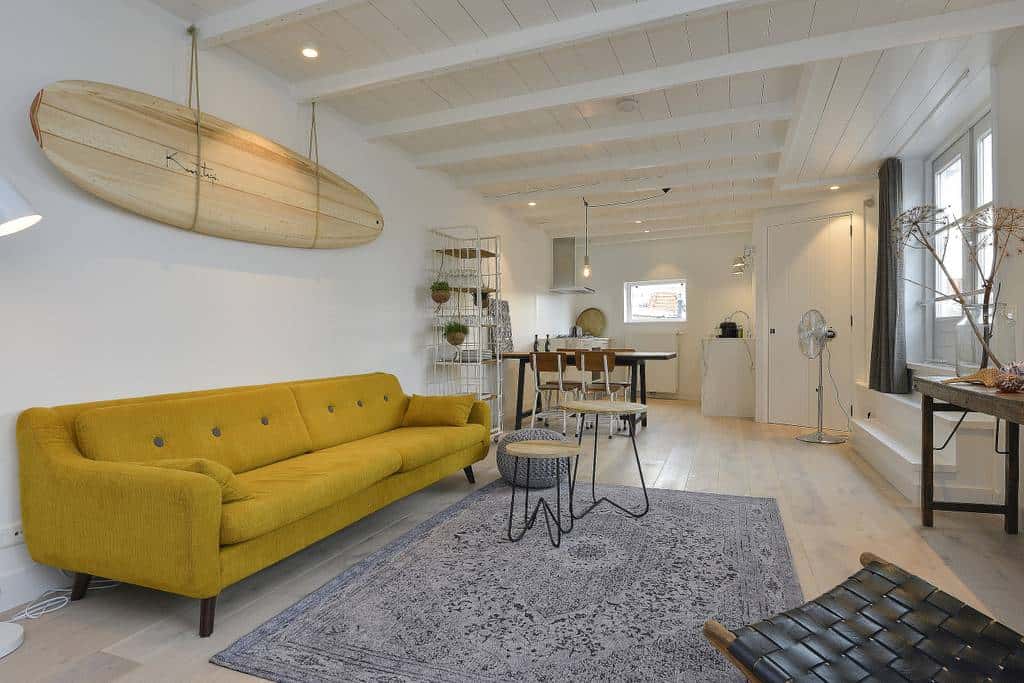Long term vs short term rent
‘’That first summer we decided to rent out our house to a mother and daughter we knew through friends. A quick and effortless option with a fixed income per month. If we would have known at the time what our income could have been with holiday rent, we never would have chosen this option as our bank account could have used a top up after the major renovations we did. ” – Evy (Wijkiki Beach House)
As soon as you decide to start renting out your property certain choices have to be made. Do you choose holiday rent (short term) or rather long term rent? Very often this decision is taken too hastily, without properly considering the pros and cons of both options. To help you out with this decision we have listed the most important things. At the end, we have a surprising option for you which includes the best of both worlds!
What exactly is short term or holiday rent?
Let’s start off with the definition of it: the renting out a furnished accommodation for a short period of time, generally stays from 1-20 nights. These accommodations are rented out per night or per week, depending on the choices that are made by the owner.
Many owners of short term rental properties rent them out almost year round, at times when they themselves are not using the place.
In recent years this type of rent has grown in popularity for both private properties as hotels with the rise of platforms like Airbnb and HomeAway.

Benefits
Although long term rent will provide you with a fixed income per month and is generally a little easier to manage, there are several advantages to short term that make the consideration worth it.
- Potentially higher income
Adjusting not only your rates but also your minimum stay, to the high and low seasons in your region will let you maximize your profits, especially in the busiest times of the year. - Greater flexibility
Owners that rent out in the holiday market are a lot more flexible. Block dates in your calendar when you want to use your property yourself or finally do that paint job without having to bother anyone. - Less wear and tear
Guests that visit for only a weekend or week, generally want to explore the area. They spend a lot of time away from your home and are not looking to move your furniture for example. - Tax advantages
A lot of owners with a holiday home are entitled to certain tax advantages (box 3) or even deductible expenses. Always check with your local authorities which regulations are applicable to your situation.
Challanges
When you manage a holiday home yourself, don’t forget to take into account all the local laws, maintenance and low seasons.
- More upgrades
To prevent negative reviews, a short term rental accommodation needs to be well maintained. Besides regular cleaning, you should also consider unclogging drains, replacing outdated devices and touching up a painted wall. - No guaranteed income
A major frustration of many owners is the fluctuation of seasons. After a year filled with uncertainty and with COVID-19 among us, everyone understands holiday rent is not always polkadots and moonbeams. Of course you can play around with your rates, but no one will give you a guarantee of a filled calendar. - Competition from neighbouring properties
Unlike the housing market, where flats and apartments are flooded with tenants, the balance in between guests and accommodations is reversed in the holiday rent. When you are located in a region with already numerous short term accommodations, this can be a serious downside. - Time and effort
Some owners see hosting as a hobby, others see it as a fulltime job. There are various things to take care of. Making sure your availability is up to date, arranging your booking process to run smoothly, the checking in and out of guests, cleaning, maintenance and so on. It can become time consuming quite quickly, especially when you don’t have the right tools at hand.
What exactly is long term rent?
Unlike short term rent, this type of accommodation is rented out for a month or more. It can be just one room but also a whole house. Generally, the tenants pay a monthly amount and cover other expenses themselves, like gas and energy bills.
Several pros can be listed for renting out long term. Most important are the following:

Benefits
- Fixed income
The greatest advantage to long term rent is that you know what your income will be at the end of the month. A comforting feeling, especially for owners that have other expenses to worry about or that have made a big investment. Besides that, tenants generally cover utility bills themselves. - Easy to manage
Whether you choose to host the guests yourself or outsource this to a property manager, you will soon discover that this type of rent requires substantially less time and effort than short term rent. There is no need to continuously promote your accommodation to keep your flow of income going or to prepare it for new guests. - Fewer changes of guests
If you rent out your accommodation long term to guests, you won’t have to worry as much about administration, key collections and promotions. After the guest signs the contract and checks in to the place, you will only have to start worrying about all of the mentioned things when their check out date arrives. - Unfurnished possibility
Some of the long term tenants prefer to bring their own furniture. You can decide to rent out your place unfurnished so you won’t need to fix or replace anything and still receive your monthly income.
Challenges
The most noteworthy disadvantage of this type of rental is the significantly lower income potential.
- Lower income
The rates of a long term accommodation can easily drop to 50% of the holiday rate. Besides that, it is pretty impossible to adjust the rates to the changes of seasons. - Less flexibility
When you rent out your accommodation for multiple months, you cannot spend the christmas days in your own chalet or apartment by the sea. Of course you can’t ask your fulltime tenant to leave for a couple of days. Especially for owners that have invested so they can enjoy the property themselves as well, this can be a big downside. - Less control
With short term rent you can check the state of your accommodation and belongings after every check out. When guests are staying for a month or longer, you will have to plan and arrange a check up or maintenance visitation beforehand in agreement with them.
- Finding the right tenant.
If someone is going to stay quite some time in your house, you want to be sure he or she is a good fit. The time spent on getting to know the guest and checking the references before you draw up your rental agreement, can take up some time. And even then, no guarantees can be given.
Get updates and learn from the best
Subscribe To Our Newsletter
What is the best pick for you?
There is no clear answer to what the ideal option is as it depends greatly on the situation. What sounds like a big pro for you can be a turnoff for someone else.
The biggest differentiation between these two types of rent is the income. Research shows that short term rent results in a 30-40% higher income than long term rent.
Our own experience tells us that for an accommodation can be rented out long term for € 1.000,- per month, the income can be tripled in the holiday rent market. Yearly, the difference can be about € 24.000,- with the same property!
Holiday rent requires more time and effort, but we think the investment is very much worth it. Especially with the right help. Renting out short term is a great way to generate higher income and have more flexibility.
A lot of accommodations will reach the highest income potential when you combine long term rent in the winter months with holiday rent in the high season. Rental Valley’s systems and processes are built to easily switch in between the types of rent and therefore we can guarantee minimal vacancy rates. Especially in the past year with all the COVID-19 related challenges, this combination proved to be a great advantage.
Still unsure what to do or do you want to know more about what we can do for you?
Give us a call or send us a message


